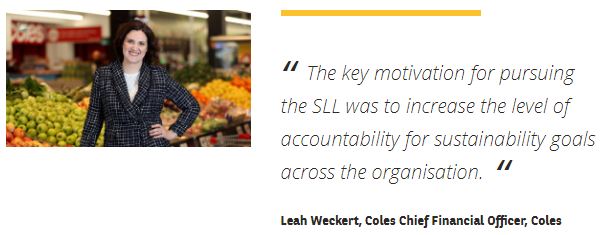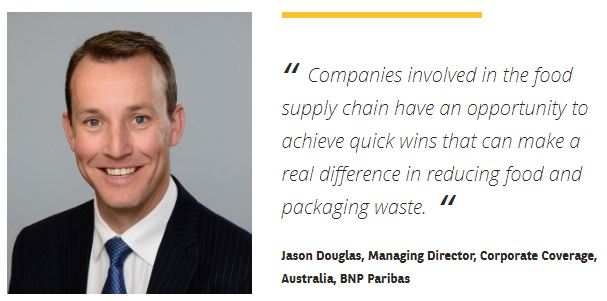Leading supermarket chain Coles has committed to dramatically reducing food waste in the first sustainability-linked loan in Australia’s retail sector.
Reducing waste is one of the key issues economies and businesses must address to create a better Australia for future generations.
This is what Coles aimed to tackle when it recently closed its first Sustainability Linked Loans (SLL), the largest transaction of its kind in Australia’s retail sector.
BNP Paribas acted as joint sustainability coordinator on the A$1.3 billion in revolving credit facilities, which are tied to key ESG performance indicators (KPIs) linked to the diversion of waste from landfill, reduction in greenhouse gas emissions and an increase in the percentage of women in leadership roles.
To incentivise a change in behaviour aligned with Coles’ strategic objectives, these KPIs were carefully chosen to represent elements of the company’s sustainability streams – emissions, waste and diversity. The SLLs incentivise Coles to meet and accelerate its sustainability targets through margin adjustments.

“The key motivation for pursuing the SLL was to increase the level of accountability for sustainability goals across the organisation,” said Coles Chief Financial Officer Leah Weckert. “We announced in 2019 our ambition to be Australia’s most sustainable supermarket and this SLL forms a key part of our strategy.
“It is also an opportunity for Coles to demonstrate our leading role as a large Australian business, by being the first Australian supermarket to issue a SLL, which is the largest to date for a retailer in the local market,” Weckert continued.
While the loan is a first for the Australian market, Coles has already earned a reputation as an early proponent of sustainability. The company recently launched its Sustainability Strategy under two focus areas: “Together to Zero” and “Better Together”.
A $1 trillion problem
Waste in the global food industry is a $1 trillion problem. Every year about a third of the food produced for humans is lost, amounting to 1.3 billion tonnes – enough to feed three billion people – and 4.4 gigatons of unnecessary greenhouse gases.[1]

The transition to a more sustainable food supply chain will require investment and commitment from all parties – producers, suppliers and retailers. The financial sector also has an important part to play in mobilising funding from the growing pool of capital available to support ESG initiatives.
“Companies involved in the food supply chain have an opportunity to achieve quick wins that can make a real difference in reducing food and packaging waste,” said Jason Douglas, Managing Director, Corporate Coverage at BNP Paribas in Australia. “The knock-on effects of realising these efficiencies can significantly move the needle across a range of issues from carbon emissions to plastic pollution, while also feeding those in need.”
Going Circular
Reducing the amount of waste going to landfill requires a transition to a more circular economy, where a higher percentage of waste is repurposed or recycled for other uses, along with a more efficient supply chain. The UN’s Sustainable Development Goals (SDG) target 12.3 aims to halve per-capita global food waste by retailers and consumers and reduce food losses in production and distribution. The UN splits the goal into two indicators:
- Indicator 12.3.1(a), the Food Loss Index, measures losses for key commodities in a country across the supply chain, up to and not including retail; and
Indicator 12.3.1(b), the Food Waste Index, measures food and inedible parts wasted at the retail and consumer levels (household and food service). In contrast to the Food Loss Index, the Food Waste Index measures total food waste (rather than specific commodities).[2]
Circularity requires economies to rethink how they produce, consumer and dispose, aligning our linear consumption behaviour to nature’s cyclical model. Solutions span the entire supply chain and range from relatively basic concepts – such as replacing plastic with compostable packaging – to the use of advanced technology to ensure the traceability of goods, for example.
Alongside more efficiency in farming, processing and transport, technology also offers ways to optimise food production through data analysis. Companies like Winnow[3] aim to make commercial kitchens more efficient by monitoring what ingredients are discarded and ‘learning’ how to minimise waste. Smart supply chains that incorporate digital tracking also allow for faster transit times and reduce spoilage.
Food waste can also be redirected to needy communities or used as an input for animal feed or fertilisers – repurposing products that would otherwise go to landfill. In Australia, non-profits like Secondbite[4] and Foodbank[5] work with producers, processors and retailers to distribute excess or rescued foodstuffs to communities vulnerable to food poverty. In 2020, Coles announced it would donate extra food and groceries to the retail value of AUD $1 million a week to food rescue organisations, Secondbite and Foodbank, to help Australians who are facing hardship as a result of Covid-19.[6] Since 2011, Coles has provided the equivalent of 182.9 million meals through its partnerships with SecondBite and Foodbank.
Reduce, reuse, recycle – and refinance
Finance is a key lever to help accelerate the transition through sustainability-linked financings, which provide flexible funds for general corporate purposes but encourage borrowers to meet specific, measurable targets through variable financing costs.
Coles’ SLL follows a handful of international food retailers who have used sustainable finance in a push to decarbonise their operations, including:
- Ahold Delhaize: How sustainable finance is tackling food waste
[1] https://earth.org/facts-about-food-waste/
[2] https://www.unep.org/resources/report/unep-food-waste-index-report-2021?__cf_chl_managed_tk__=pmd_gPvCY7.3rO6VhtPYpdelWzV4C1fA9sk7f1HD2olAlE8-1630481194-0-gqNtZGzNAyWjcnBszQlR/
[3] https://www.winnowsolutions.com/
[4] https://secondbite.org/about-us/
[5] https://www.foodbank.org.au/?state=nsw-act
[6] https://www.colesgroup.com.au/media-releases/?page=Coles-donates-extra–1-million-a-week-in-food-for-vulnerable-Australians

